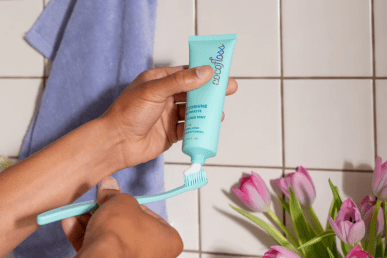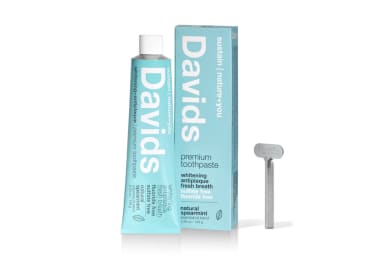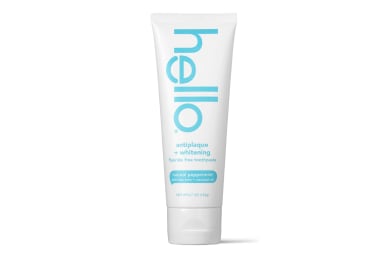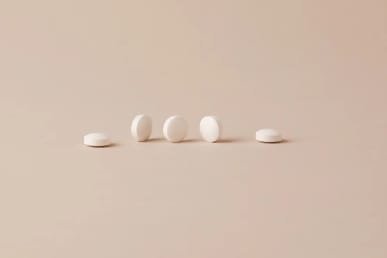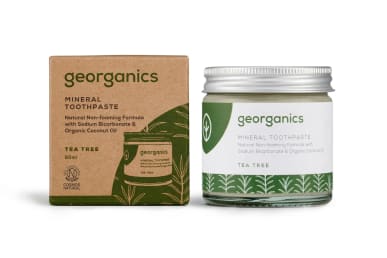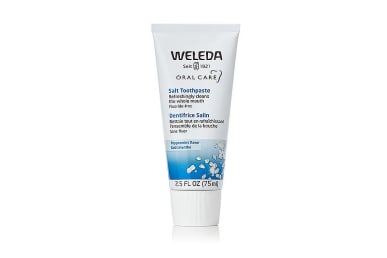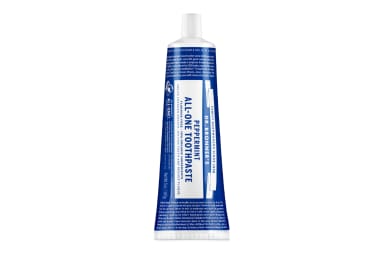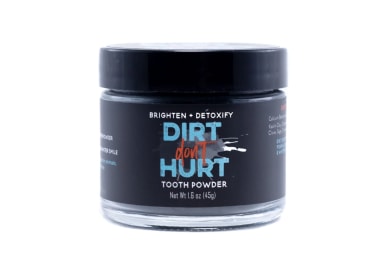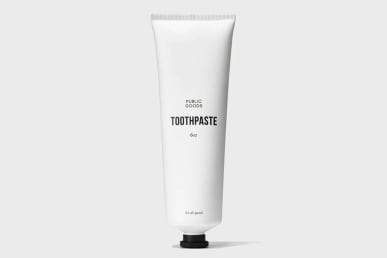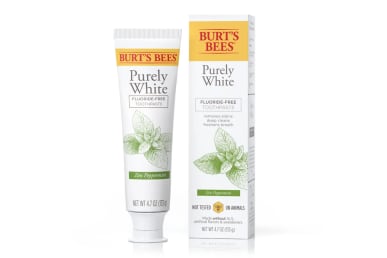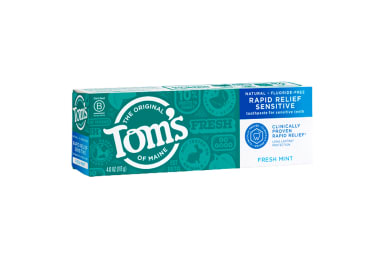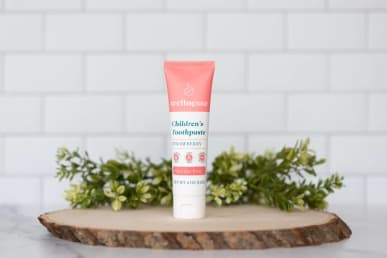Advertisement
We Tested The 12 Best Natural Toothpastes For Complete Oral Wellness


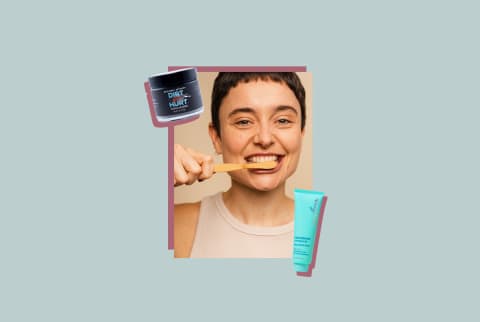
Quick question: How often do you think about your toothpaste? If your answer is a resounding, Uh, not really, let's take a moment to chat about your trusty tube. Oral care is incredibly important: The smile is a pillar of the aesthetics of the face. Having bright teeth and healthy gums can transform an overall appearance. But it's not just aesthetics—a healthy smile is vital for digestion and overall inflammation in the body. Seriously: Periodontal disease1 is linked to chronic, systemic inflammation in the body.
And considering you reach for your toothpaste twice a day to keep your teeth and gums healthy it’s certainly worth evaluating what sort of formula you’re using.
Enter: These high-quality, safe, and natural toothpastes. If you’re one to use natural and clean products elsewhere in your routine, it’s only—ahem—natural that you might want to consider a natural toothpaste as well. And the good news is that modern formulas are highly effective, come in a wide variety, and are about the same price as a standard tube.
Here, the best options according to the mbg editorial team.
A quick look at the best natural toothpastes
- Best whitening: Cocoshine Whitening Toothpaste ($22)
- Best natural: Davids Premium Natural Toothpaste ($10)
- Best for bad breath: hello antiplaque + whitening fluoride free toothpaste ($6)
- Best tablet: by Humankind Toothpaste Tablets ($12)
- Best paste: georganics Mineral Toothpaste Tea Tree ($10)
- Best mineral: Weleda Salt Toothpaste ($7)
- Best organic: Dr. Bronners All-One Toothpaste ($10)
- Best activated charcoal: Dirt Don't Hurt All-Natural Activated Charcoal Tooth Powder ($15)
- Best budget-friendly: Public Goods Toothpaste ($6)
- Best drugstore natural toothpaste: Burt's Bees Purely White Zen Peppermint Toothpaste Fluoride-Free ($6)
- Best for sensitive teeth: Tom’s Of Maine Fluoride-Free Rapid Relief Sensitive Toothpaste ($6)
- Best for children: Wellnesse Children’s Strawberry Toothpaste ($15)
The best natural toothpastes
I recently tried out this new toothpaste prior to its launch, I can confidently say that the formula has made my teeth appear way less dull. My smile looks shinier, my gums look healthier, and most importantly, my teeth feel stronger. No more wincing every time I take a sip of an ice-cold drink or avoiding certain areas while I brush. And my gums feel more comfortable with each passing day.
Ingredient highlights
Ingredient highlights
- 3% concentration of nano-hydroxyapatite (n-HA) can help re-mineralize teeth (a fluoride alternative)
- Baking soda
- Silica
- Xylitol
- Coconut oil
- Aloe vera
- Free of fluoride, sulfates, parabens, propylene glycol, triclosan, peroxide, artificial dyes, and artificial sweeteners.
Pros
Pros
- Microbiome-friendly
- Innovative fluoride alternative helps remineralize the tooth
- Dentist formulated
Cons
Cons
- Only direct-to-consumer at the moment, so can only find it via the website
- Expensive
A family owned and operated toothpaste company with high-quality, locally sourced, natural ingredients. It has an unbeatable minty-fresh feel—made with just peppermint, spearmint, orange peel oil, anise and stevia—for a top-notch sensorial brushing experience.
Ingredient highlights
Ingredient highlights
- Baking soda
- Silica
- Xylitol
- Seaweed extract
- Peppermint, spearmint, anise, and orange peel essential oils
- Free of SLS, fluoride, parabens, propylene glycol, triclosan, peroxide, and artificial dyes
Pros
Pros
- Sustainable metal tube
- 98% USA origin ingredients
Cons
Cons
- 98% USA origin ingredients
- Not travel friendly
hello antiplaque + whitening fluoride free toothpaste
This multi-tasking formula targets tartar and plaque for a seriously clean smile. It also gently brightens (sans peroxide) with minerals and hydrates and soothes the gums with coconut oil. It’s particularly good at targeting funky breath, as it contains antibacterial tea tree oil. mindbodygreen beauty director Alexandra Engler notes that she’s tried several options from hello and uses their toothpaste regularly “This formula leaves the mouth feeling so fresh—and that freshness basically lasts all day or night!”
Ingredient highlights
Ingredient highlights
- Tea tree
- Coconut oil
- Farm grown peppermint
- Silica
- Glycerin
- Free of fluoride, dyes, artificial sweeteners, artificial flavors, SLS/sulfates, parabens, microbeads, triclosan, and gluten
Pros
Pros
- Comes in two sizes: 4.7 fl oz and 1.0 fl oz
Cons
Cons
- Contains stevia if you avoid that
Since toothpaste tubes are notoriously difficult to recycle, tablets have become a popular eco-friendly option. They're pre-portioned, easy to use, (just pop one in, chew, and brush), and these tabs come in a cute, customizable glass container.
Ingredient highlights
Ingredient highlights
- Uses sodium fluoride
- Baking soda
- Silica
- Free of preservatives (like parabens), triclosan, gluten, and artificial dye
Pros
Pros
- Eco-friendly packaging, refillable, and carbon neutral shipping
- Preservative free
Cons
Cons
- For lots of folks used to mainstream toothpaste, tablets can feel strange at first
- Only direct-to-consumer at the moment, so can only find it via the website
So many folks are used to the classic foaming gel paste—but this jarred option is creamy and rich. Just because it doesn't froth doesn't mean it's not working (think of it like a sulfate-free shampoo—it’s still cleaning the scalp even if it’s not sudsing up). This paste won't foam but comes loaded with coconut oil, kaolin clay, vitamin E, and tea tree oil—which has been shown to be helpful against gingivitis2.
Ingredient highlights
Ingredient highlights
- Coconut oil
- Kaolin clay
- Vitamin E
- Tea tree oil
- Baking soda
- Shea butter
- Free of fluoride, SLS, parabens, microbeads, triclosan, and glycerin
Pros
Pros
- Organic ingredients
Cons
Cons
- Jarred toothpaste can be less convenient and harder to travel with
- Only direct-to-consumer at the moment, so can only find it via the website
To an extent, your mouth is self-cleaning. Your saliva has antimicrobial properties3 and enzymes that help combat unwanted bacteria. That's exactly why this toothpaste contains sea salt, as it stimulates your saliva glands and kick-starts the self-cleaning process. The salivation increases the cleansing power of the other ingredients, too. This is important as some folks don’t produce as much saliva, especially with age. There's also peppermint oil, so you don't feel like you're swishing saltwater.
Ingredient highlights
Ingredient highlights
- Sea salt
- Silica
- Baking soda
- Blackthorn juice
- Ratanhia root extract
- Horse chestnut seed bark
- Peppermint oil
- Jojoba seed oil
- Free of surfactants, synthetic preservatives (like parabens and triclosan), synthetic flavors, colorants, and raw materials derived from mineral oils.
Pros
Pros
- Helps improve saliva production
Cons
Cons
- While the peppermint helps, it does have a distinctly salty taste
Our assistant beauty and health editor Hannah Frye swears by this organic formula: “I don’t often order my toothpaste days before I’ll need a new one (oops), so I need a product I can easily find at the market—enter, the Dr. Bronner’s Toothpaste. This one gets the job done without artificial flavors and colors. The formula works to slough plaque and buildup off your teeth without leaving a burning feeling like many mainstream products do, thanks to the natural soothers aloe vera and coconut oil. Plus, it’s budget-friendly.”
Ingredient highlights
Ingredient highlights
- Methol crystals
- Peppermint essential oil
- Coconut flour
- Coconut oil
- Aloe
- Free of fluoride, SLS, artificial colors, artificial flavors, carrageenan, preservatives, synthetic sweeteners, detergent foaming agents
Pros
Pros
- 70% organic ingredients & several Certified Fair Trade ingredients
- Comes in two sizes and four flavors
- Accessible and budget friendly
Cons
Cons
- Contains glycerin sourced from organic soy, in case you avoid that altogether
All-Natural Activated Charcoal Tooth Powder by Dirt Don't Hurt
When it comes to natural teeth whitening, charcoal receives a ton of hype. The famed ingredient is beloved for drawing out impurities, including stains on the enamel—many anecdotally swear by it for keeping their smile bright white. This powder is highly effective at targeting stains—only using natural ingredients. Again, charcoal won't foam as you brush, so don't try to work it into a lather; gentle pressure is key with this dry powder.
Ingredient highlights
Ingredient highlights
- Activated charcoal
- Bentonite clay
- Sage
- Turmeric
- Free of SLS, fluoride, and glycerin
Pros
Pros
- Effective whitening ingredients that won’t sensitive teeth or gums
Cons
Cons
- For those used to a paste, powders might take some getting used to: Wet brush, dip bristles into powder, brush, and rinse.
- Expensive
This fluoride- and SLS-free paste is thick and goopy (like your conventional gel toothpaste), and it features a dual-grit abrasive to buff away plaque and stubborn stains. With peppermint oil for taste, it's just like your conventional tube—just a bit cleaner.
Ingredient highlights
Ingredient highlights
- Silica
- Glycerin
- Coconut extracts
- Peppermint
- Free of fluoride, SLS, parabens, phthalates, or gluten, synthetic fragrance, or formaldehyde
Pros
Pros
- Affordable
Cons
Cons
- Contains sodium saccharin, a sweeter in case you avoid that
Purely White Zen Peppermint Toothpaste Fluoride-Free by Burt's Bees
This fluoride-free formula features hydrated silica (which is derived from sand) to gently buff away surface stains. The result? A dazzling, minty white.
Ingredient highlights
Ingredient highlights
- Silica
- Peppermint oil
- Free of SLS, triclosan, parabens, artificial flavors & sweeteners, dyes (blue, yellow, red) and plastic microbeads
Pros
Pros
- Affordable
- Landfill-free operations
Cons
Cons
- Contains stevia, in case you avoid that
Tom’s Of Maine Fluoride-Free Rapid Relief Sensitive Toothpaste
This uses the amino acid arginine and purified calcium to ease sensitivity in the tooth and gum area. It does so immediately: The patented, clinically proven formula provides relief in 60 seconds (for fast action relief, apply it directly to the affected area and gently massage). But it also supports the teeth long-term, so overtime they naturally become less sensitive.
Ingredient highlights
Ingredient highlights
- Purified calcium
- Arginine
- Silica
- Peppermint
- Baking soda
- Free of fluoride, paraban, triclosan, formaldehyde, artificial color, dye free, artificial sweeteners, artificial flavor, mineral oil, phthalate, SLES, PEG, DEA, microbeads, and gluten
Pros
Pros
- The formula has been studied clinically
Cons
Cons
- Contains coconut oil derived SLS
The other options on this list are safe for children, but they may not be the most appealing for kids. This option is topped with a natural strawberry flavoring to help sweeten the deal. Our beauty director Engler uses Wellnesse toothpaste (the mint flavor) and can vouch for their efficacy: “These leave your mouth feeling fresh and clean. It honestly doesn’t feel much different than a conventional toothpaste, which I love. Even house guests have used it and noted how much they liked it.”
Ingredient highlights
Ingredient highlights
- Silica
- Baking soda
- Aloe
- Free of sulfates, fluoride, paraban, triclosan, formaldehyde, mineral oil, phthalate, PEG, and microbeads
Pros
Pros
- Packaging is made with compostable sugarcane bioplastic
Cons
Cons
- Contains stevia if you avoid that for you and your family
- Pricey
Why you should trust us
As the leaders in clean beauty, we are diligent researchers into ingredients, formulas, and safety. We only recommend formulas we trust and would use ourselves.
We’re also experts in overall health and longevity. Given oral health is very closely connected to digestive health4, circulatory health5, respiratory health, and full-body inflammation6—we believe that prioritizing oral hygiene is critical.
We also got this article and selections reviewed by functional dentist Meghna Dassani, DMD. Dassani is a specialist in sleep apnea, and her practice focuses on helping adult and pediatric patients with sleep-disordered breathing get the treatment they need to live healthier, happier lives. Before attending Goldman School of Dental Medicine at Boston University, Dassani operated a successful dental practice in Mumbai. For the past 18 years, she has been practicing in Houston, Texas.
What do you mean by "natural" toothpaste?
There is no regulated definition of the word “natural” in the beauty or personal care industries. Often, it’s up to the brand to outline what they mean by it, what ingredients in their formulas are natural, and what they choose not to include.
At mindbodygreen, we most often recommend clean and natural-leaning formulas. To us, “clean” means products that only use safe, gentle, yet effective ingredients—and leave out ingredients that have questionable safety profiles. Clean ingredients can be both natural and lab-derived.
Natural ingredients are those that are extracted from the earth, such as minerals and botanicals. Many plant- and mineral-derived ingredients can be hugely beneficial for the body—sometimes more so than lab-derived ingredients. However, we do not think every formula needs to be 100% natural. In fact, there are many synthetic ingredients that are safe, effective, and useful.
Ingredients to look for in natural toothpaste
Here are the most common natural and clean ingredients to keep an eye out for in formulas:
- Silica (hydrated silica): Silica is a safe ingredient that’s commonly found in natural, clean, and conventional formulas. It’s a mild abrasive that gently removes buildup, plaque, and stains.
- Nano-hydroxyapatite: In the absence of fluoride, clean and natural formulas turn to this innovative ingredient7 to strengthen enamel and remineralize the bone.
- Coconut oil: This is often added to formulas to help hydrate, fight free radicals, and improve the formula's texture. Some studies indicate that oil-pulling with coconut oil can reduce plaque buildup8, improve the oral microbiome, and reduce inflammation.
- Aloe: Aloe is an anti-inflammatory botanical 9that can help improve gum health10.
- Baking soda: Baking soda is added to formulas as a pH balancer. Since the ingredient is alkaline, it can reduce acidity in the mouth11 (acidity can lead to tooth decay).
- Botanical flavors (such as peppermint essential oils): Most natural toothpastes flavor with extracts from fruits or herbs, such as peppermint. Sometimes they’ll use essential oils. (Note: Some folks find EOs irritating.)
- Plant-derived surfactants: In the place of SLES and SLS (sulfates), clean formulas turn to plant derived surfactants like coco glucoside, Caprylyl/Capryl glucoside, cocamidopropyl betaine and lauryl glucoside.
Ingredients to avoid in natural toothpaste
The ingredients to avoid aren’t as cut and dry—in fact, a few of the buzzy ones require a big heap of nuance when discussing them.
Sulfates
Sulfates are powerful detergents that are ubiquitous in the personal care industry, from shampoos and hand washes to toothpastes.
Given how strong they are, they can strip the skin, gum, and teeth of its protective elements—leaving it dry and vulnerable. They can also disrupt the oral microbiome, trigger inflammation, and cause flare-ups of oral conditions.
There are much gentler cleaners on the market (such as plant-derived surfactants), so we encourage folks to try switching to sulfate-free options.
Fluoride
Fluoride is used to strengthen enamel and fight cavities12 (good things!). Some folks express concern about using it, as very high doses of fluoride can have adverse effects called fluoride toxicity.
This is why you should never swallow or eat fluoride toothpastes. (Please note: Fluoride is present in water, however, it would take a lot of fluoride to meet the threshold for toxicity.) Given its potential for toxicity, some choose to avoid it altogether—and instead opt for fluoride alternatives.
Finally, some folks avoid it as it can trigger irritation for those who are sensitive. For example, some dermatologists note it can make perioral dermatitis worse.
Other ingredients to avoid:
- Paraban
- Triclosan
- Formaldehyde & formaldehyde donors
- Artificial color
- Artificial sweeteners
- Artificial flavor
- Mineral oil
- Phthalate
- Sulfates, including SLS and SLES
- Polyethylene glycol (PEG)
- Microbeads
- Gluten (if you’re allergic or have sensitivities)
- Soy (if you’re allergic or have sensitivities)
The takeaway
You may not think much about your toothpaste, but you should! Oral health is critical to overall health. These are our favorite natural toothpastes.
Ready to learn about how to brighten that smile? Read all about how to whiten your teeth at home.
12 Sources
- https://www.ncbi.nlm.nih.gov/pmc/articles/PMC8578868/
- https://www.ncbi.nlm.nih.gov/pmc/articles/PMC7069753/
- https://www.ncbi.nlm.nih.gov/pmc/articles/PMC6855406/
- https://www.ncbi.nlm.nih.gov/pmc/articles/PMC8343087/
- https://www.ncbi.nlm.nih.gov/pmc/articles/PMC8361186/
- https://www.ncbi.nlm.nih.gov/pmc/articles/PMC9259379/
- https://www.ncbi.nlm.nih.gov/pmc/articles/PMC4252862/
- https://www.ncbi.nlm.nih.gov/pmc/articles/PMC7475120/
- https://www.ncbi.nlm.nih.gov/pmc/articles/PMC6330525/
- https://www.ncbi.nlm.nih.gov/pmc/articles/PMC3800403/
- https://www.ncbi.nlm.nih.gov/pmc/articles/PMC6850485/
- https://www.ncbi.nlm.nih.gov/pmc/articles/PMC6727672/
